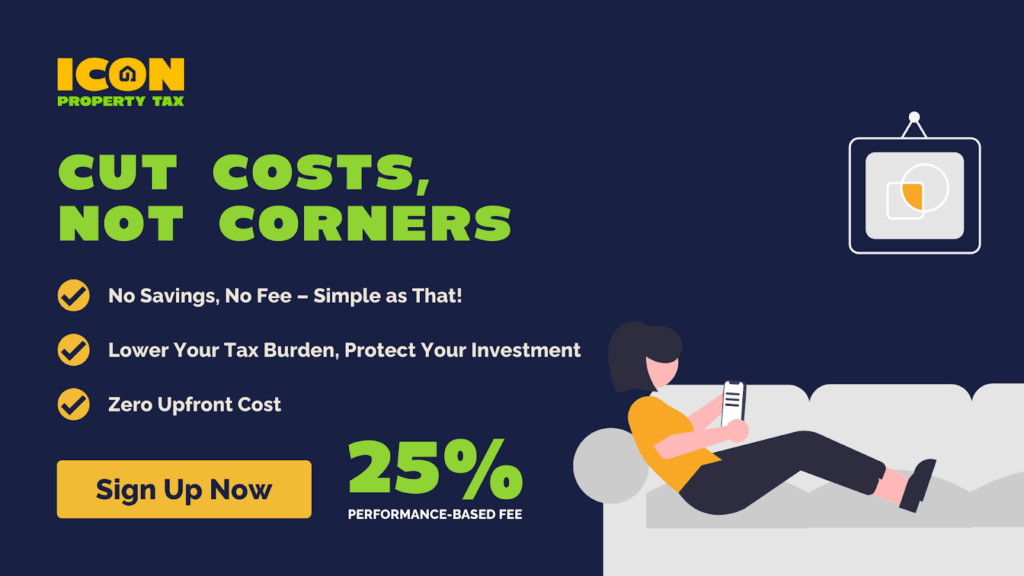Texas Cost Of Living Explained: Housing, Utilities, Taxes & More
August 15, 2025
Key Takeaways:
- Texas Housing Variability: The cost of housing varies widely between urban and rural areas, with cities like Austin being significantly more expensive.
- Property Tax Reality: Texas has no state income tax, but high property taxes can offset that benefit if not actively managed.
- Smart Savings Tip: Protesting your property tax assessment is one of the most effective ways to lower your ongoing cost of living in Texas.
Understanding the cost of living in Texas goes beyond just looking at housing prices or grocery bills. It’s a complex picture shaped by rising property values, varying utility rates, no state income tax, and high local property taxes. While many people move here for affordability, the reality is that certain costs, especially for homeowners, can climb fast if not managed properly. That’s why knowing what to expect and how to control the expenses you can is more important than ever.
At Icon Property Tax, we’ve helped thousands of Texas homeowners reduce their property tax burden, recovering millions of dollars in over-assessed values along the way. With deep knowledge of local tax codes, market trends, and county appraisal practices, we’ve built a reputation on one simple principle: if you don’t save, you don’t pay.
In this piece, we’ll break down the real cost of living in Texas, from housing and utilities to taxes, and show you where you can take back control.
What Makes Up The Cost Of Living In Texas?
The cost of living in Texas includes several key components that directly affect your day-to-day spending and long-term financial plans. These include housing, property taxes, utilities, food, transportation, healthcare, and other basic services. While Texas is often seen as more affordable than many coastal states, your experience can vary significantly depending on the city or region you choose.
Housing is typically the largest expense, followed by property taxes, which, in Texas, are notably higher due to the absence of a state income tax. Utility costs can also fluctuate depending on the season, especially during peak summer months. Transportation costs remain relatively consistent, though rural areas may require longer commutes.
Want to protect your investment and only pay when you save? Lower your tax burden with Icon Property Tax, there’s zero upfront cost.

Housing Costs Across Texas Cities
Texas offers a wide range of housing prices depending on where you choose to live. Urban centers like Austin and Dallas tend to have higher home prices, driven by population growth, tech industry expansion, and limited housing inventory. In contrast, cities like San Antonio, Houston, and El Paso generally offer more affordable options, especially for first-time buyers.
- Austin: One of the most expensive markets in Texas. Home prices have risen sharply in recent years, driven by demand and limited space.
- Dallas-Fort Worth: A strong job market and expanding suburbs mean prices can range significantly depending on the neighborhood.
- San Antonio & Houston: These cities provide more room for your dollar, with a variety of housing types and price points.
- El Paso & Lubbock: Smaller cities where the cost of living, including housing, remains well below the national average.
Even in more affordable cities, rising home values can mean rising property taxes. That’s why it’s critical to stay on top of your property tax assessments. Protect your investment and pay nothing unless you save. File with Icon Property Tax and get support backed by our no-savings, no-fee pledge.
Property Taxes In Texas: What You Need To Know
Texas doesn’t collect state income tax, which is good news for many residents. However, that shortfall is often made up through higher-than-average property taxes. Texas consistently ranks among the states with the highest property tax rates in the country.
Property tax rates vary by county and city, but the state average hovers around 1.6% to 2.3% of a home’s assessed value. That may not sound high at first, but as property values increase, especially in booming areas like Austin, Dallas, and Houston, so do your tax bills.
Many homeowners don’t realize they have the right to protest their property tax assessment each year. Most assessments are automated, and errors or overestimations are common. If left unchecked, you could end up overpaying by thousands of dollars over time.
That’s where Icon Property Tax comes in. We handle the protest process from start to finish. Stand your ground and protect your investment. Get started with zero upfront cost, our no-savings, no-fee pledge keeps things simple.
Utilities And Everyday Expenses
While Texas is known for affordable housing in many areas, utility costs and everyday living expenses can still impact your overall budget. Due to the state’s hot climate, electricity bills tend to spike during the summer months, especially in homes relying heavily on air conditioning.
Here’s a quick overview of typical monthly utility costs for a standard household in Texas:
- Electricity: $130–$170 (can be higher during peak summer)
- Water & Sewer: $40–$70
- Internet & Cable: $60–$100
- Natural Gas (if applicable): $20–$50
Groceries and healthcare expenses are generally in line with national averages, though you’ll often find more affordable prices in smaller cities and rural areas. Transportation costs are also moderate, but since public transit isn’t as widely developed as in some other states, owning a car is almost a necessity in most regions.
Want to lower your property tax burden without the hassle? Let Icon handle the protest process, pay only if we save you money.
Comparing Texas To Other States
One of the reasons many people move to Texas is its reputation for affordability, and in many cases, that reputation holds up. Compared to states like California, New York, or even Colorado, the overall cost of living in Texas is significantly lower.
Here’s how Texas stacks up:
- No State Income Tax: Unlike California or New York, Texas doesn’t tax personal income, allowing residents to keep more of their paycheck.
- Housing: Median home prices in Texas are still well below those in major coastal states.
- Property Taxes: Texas does have higher property tax rates, but this is partially offset by the lack of income tax.
- Utilities and Services: Utility rates are comparable or slightly higher depending on the area, but other services like car insurance and gas tend to be cheaper.
The bottom line: Texas offers a favorable cost of living compared to many states, but only if you manage key expenses wisely. Housing affordability can be undermined by rising property taxes, which makes tax strategy just as important as location.
Ready to protect your budget and lower your property taxes? Start your protest with Icon Property Tax, no upfront costs, no savings, no fee.
How To Save On Your Texas Property Taxes
Saving on property taxes in Texas is not only possible, it’s essential if you want to protect your home’s long-term affordability. Here’s how you can take action:

File A Homestead Exemption
If your home in Texas is your primary residence, you may be eligible for a homestead exemption. This exemption reduces the taxable value of your home, which directly lowers the amount of property taxes you owe. It’s one of the simplest and most impactful ways to reduce your annual costs, but many homeowners forget to file.
Protest Your Property Tax Assessment
Every year, appraisal districts assign a market value to your property, and those values aren’t always accurate. Many assessments overvalue homes, leading to unnecessarily high tax bills. By filing a protest, you can challenge that valuation and potentially reduce what you owe, and at Icon, we handle the entire process on your behalf.
Check For Additional Exemptions
Beyond the homestead exemption, Texas offers several other exemptions for qualifying groups, including seniors over 65, disabled homeowners, and veterans. These can significantly reduce your tax burden, especially when combined with other exemptions. But they’re not automatic, you need to apply through your appraisal district.
Review Your Assessment Every Year
Even if you’ve protested before, it’s important to look at your new property valuation each year. Market shifts, construction nearby, or clerical errors can cause your home’s assessed value to rise faster than it should. Keeping a close eye on this ensures you’re not overpaying simply due to unchecked changes.
Let A Professional Handle It
Most homeowners don’t have the time or knowledge to file an effective protest, and that’s where we come in. Icon Property Tax manages everything from research to negotiation, all backed by our no-savings, no-fee pledge. You only pay if we save you money, making it a risk-free way to reduce your property taxes.
Is Living In Texas Worth The Cost?
For many people, Texas offers a strong balance between affordability and opportunity. With no state income tax, a diverse economy, and housing options for nearly every budget, it’s easy to see why so many are relocating here. However, rising property values and the high property taxes that come with them can chip away at that value over time.
The key is understanding where your money goes and making smart financial decisions, especially when it comes to owning a home. Cities like Dallas, Austin, and Houston offer high-paying jobs and strong infrastructure, but they also come with higher living expenses. Meanwhile, smaller cities and suburbs may offer better value if you’re looking to keep costs low.
By staying proactive with your property tax strategy, you can enjoy the benefits of Texas living without letting unnecessary costs get out of control.
Lower your tax burden, protect your investment. Let Icon help you save on property taxes, no upfront cost, and you only pay if we win.

Final Thoughts
The cost of living in Texas can offer real advantages, from no state income tax to a variety of housing markets that fit different lifestyles and budgets. But those benefits can quickly be offset by high property taxes if you’re not paying attention. Whether you’re a new homeowner or have lived in Texas for years, knowing how to manage your property taxes is key to keeping your long-term costs under control.
Our team reviews your assessment, files your protest, and fights for a lower value, and you don’t pay unless we save you money. Take control of your property taxes today. Start your protest with Icon, zero upfront cost, and results you can count on.
Read Also:
- DuPage County Property Tax Overview: Rates, Assessments, and Billing Cycles
- Kane County Property Tax Overview: Rates, Assessments, And Billing Cycles
- Will County Property Tax Overview: Rates, Assessments, And Billing Cycles
Frequently Asked Questions About The Cost Of Living In Texas
What is the average monthly cost of living for a single person in Texas?
On average, a single person in Texas can expect to spend around $2,500 to $3,200 per month, including rent, utilities, groceries, transportation, and insurance, depending on the city.
Are groceries cheaper in Texas compared to other states?
Generally, grocery prices in Texas are slightly below the national average, with lower costs in suburban and rural areas. Major cities may have moderate price differences based on demand and proximity to distribution centers.
How much does transportation typically cost in Texas?
Most Texans rely on personal vehicles, so the average monthly cost, including gas, maintenance, insurance, and registration, ranges from $400 to $700. Public transit is limited in many areas.
Is health insurance more affordable in Texas?
Texas has one of the highest rates of uninsured residents, and premiums can vary widely depending on the provider and region. Employer-sponsored plans tend to offer the most value.
Which Texas cities offer the lowest overall cost of living?
Cities like Lubbock, Wichita Falls, and Brownsville are among the most affordable, offering lower housing costs, utilities, and local taxes compared to the state’s urban centers.
Does the lack of a state income tax offset the high property taxes in Texas?
For many residents, the absence of a state income tax provides significant savings, but it doesn’t always fully offset the impact of rising property taxes, especially in high-growth markets.
How do utility costs in Texas vary by season?
Utility costs are highest during the summer months due to high air conditioning use. Winter costs can be moderate unless the area relies on electric heating.
What hidden costs should new residents be aware of?
Besides property taxes, new residents should budget for vehicle registration fees, toll roads in urban areas, homeowners’ association (HOA) dues in some neighborhoods, and flood insurance in certain zones.
Is Texas a good place to retire in terms of cost of living?
Texas can be a great retirement destination due to its lack of income tax and affordable rural housing. However, retirees should plan for healthcare costs and potential property tax increases.
How often do property taxes increase in Texas?
Property taxes can increase annually, depending on changes in property values and local government budgets. Regular assessment reviews are critical to avoid overpayment.

